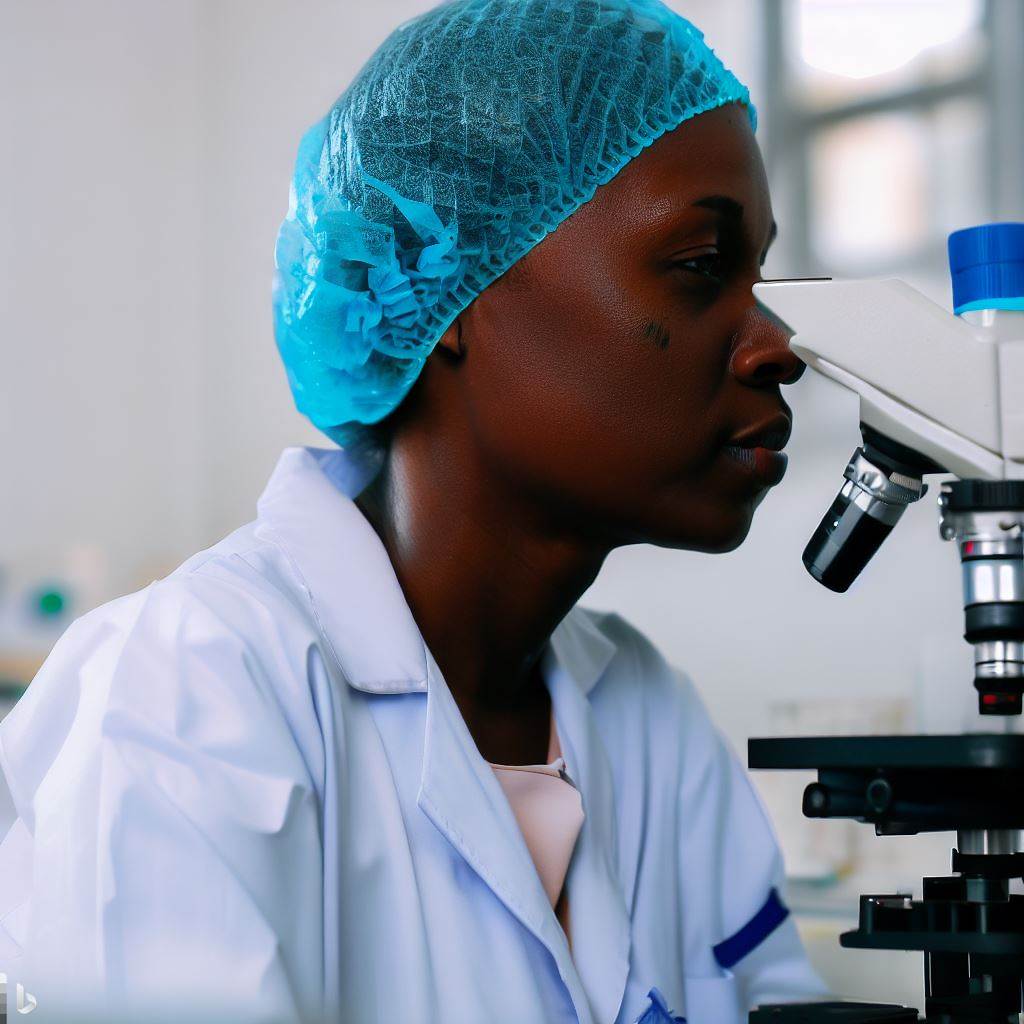Introduction
In Nigeria, there are numerous success stories of medical lab technicians who have achieved remarkable feats in their profession.
These individuals play a vital role in the healthcare system, and it is crucial to highlight their achievements to recognize their significance and relevance.
By doing so, we can appreciate their dedication and contributions to improving healthcare in Nigeria.
Overview of the Nigerian Medical Lab Technician Profession
Nigeria is home to a thriving medical lab technician profession that plays a crucial role in the healthcare system.
Lab technicians in Nigeria are responsible for conducting laboratory tests and analyzing samples.
Their role is vital in helping doctors diagnose and treat diseases accurately and efficiently.
Lab technicians perform a wide range of tasks, including collecting samples, preparing specimens, and operating laboratory equipment.
They are skilled in handling various types of laboratory equipment and conducting tests using cutting-edge technology.
Lab technicians also interpret test results, prepare detailed reports, and communicate findings to healthcare professionals.
These professionals are trained to adhere to strict safety protocols to avoid contamination and ensure accurate results.
Their work greatly contributes to the overall quality of healthcare services in Nigeria.
The role and responsibilities of lab technicians in the healthcare system:
- Sample Collection: Lab technicians are responsible for collecting samples from patients, such as blood, urine, or tissue specimens.
- Sample Preparation: They carefully prepare the collected samples for analysis by following specific protocols and procedures.
- Laboratory Testing: Lab technicians conduct various tests on the samples to detect the presence of diseases or abnormalities.
- Equipment Operation: They operate and maintain laboratory equipment, ensuring its proper functioning and accuracy.
- Data Analysis: Lab technicians meticulously analyze test results using advanced software and scientific methods.
- Quality Control: They ensure the accuracy and reliability of tests by following strict quality control measures.
- Report Preparation: Lab technicians compile detailed reports that summarize the test results and their interpretations.
- Communication: They communicate test findings to healthcare professionals, enabling them to make informed decisions.
- Research Support: Lab technicians contribute to medical research by assisting in data collection and analysis.
- Continuous Learning: They stay updated with advancements in laboratory techniques and technology through professional development.
Lab technicians work closely with doctors, nurses, and other healthcare professionals to provide accurate and timely diagnostic information.
Their contributions play a pivotal role in guiding the treatment and management of patients.
These professionals often work in hospital laboratories, clinics, research institutions, and private diagnostic centers.
The demand for skilled lab technicians in Nigeria is increasing as the healthcare sector continues to grow.
With the right education, experience, and dedication, a career as a medical lab technician in Nigeria can be incredibly rewarding.
Lab technicians have the opportunity to make a meaningful impact on the lives of patients and contribute to the advancement of healthcare.
Read: Lab Technician Profession: Nigerian Health Sector Impact
Challenges Faced by Nigerian Medical Lab Technicians
Being a medical lab technician in Nigeria comes with its own set of challenges.
These dedicated professionals play a critical role in providing accurate and timely medical diagnoses, but they often face several obstacles that hinder their ability to perform their duties effectively.
Limited resources
- Nigerian lab technicians often grapple with a shortage of essential resources, including reagents, laboratory equipment, and consumables.
- The lack of necessary supplies can compromise the accuracy and reliability of test results, making the technicians’ job more challenging.
- Without sufficient resources, they struggle to meet the demands and expectations of their patients and healthcare providers.
Inadequate infrastructure
- Another major hurdle for Nigerian lab technicians is the inadequate laboratory infrastructure across the country.
- Many laboratories lack proper ventilation systems, reliable power supply, and sufficient space for efficient workflow.
- The absence of quality infrastructure not only hampers the technicians’ productivity but also poses risks to their health and safety.
Low recognition and appreciation
- Medical lab technicians in Nigeria often struggle with the lack of recognition and appreciation for their crucial role in the healthcare system.
- Their contributions are often overshadowed by doctors and nurses, leading to a lack of appreciation and career growth opportunities.
- Due to this low recognition, lab technicians may experience low job satisfaction and feel undervalued in their profession.
Inadequate training and professional development
- Many Nigerian lab technicians face challenges related to inadequate training and limited opportunities for professional development.
- The quality of training programs varies, and some technicians receive insufficient practical experience.
- Inadequate training can impact their ability to stay updated with the latest technological advancements and best practices in their field.
Lack of standardization and regulation
- The absence of proper standards and regulations within the medical laboratory sector poses challenges for lab technicians.
- Without standardized protocols and guidelines, there can be variations in testing methods and interpretation of results.
- This lack of standardization jeopardizes the reliability and comparability of laboratory findings, affecting patient care.
Heavy workload and time constraints
- Nigerian lab technicians often face a heavy workload and time constraints, leading to increased stress and diminished efficiency.
- The high patient volume and limited staffing can result in a backlog of samples and delayed test reporting.
- The pressure to maintain quick turnaround times while ensuring accurate results can be overwhelming for lab technicians.
Funding and budgetary constraints
- Insufficient funding and budgetary constraints are significant challenges faced by Nigerian medical lab technicians.
- The healthcare system’s limited allocation of funds often leaves little room for investment in laboratory infrastructure and resources.
- Lab technicians have to cope with these financial limitations, affecting their ability to provide high-quality services.
Basically, Nigerian medical lab technicians encounter various challenges that hinder their efficiency and effectiveness in delivering healthcare services.
Addressing these challenges requires significant investment in resources, infrastructure, training, standardization, and recognition for the vital role they play in the healthcare system.
Read: Challenges Faced by Medical Lab Technicians in Nigeria

Success Story 1: Overcoming Limited Resources
In Nigeria, medical lab technicians face limited resources in healthcare services but overcome challenges with innovation and dedication.
Meet Dr. Ade, who achieved exceptional care through:
- Leveraging technology with electronic medical records (EMRs).
- Using solar panels for consistent power supply.
- Collaborating with NGOs for additional resources.
- Continuous professional development to enhance skills.
- Resourceful improvisation of lab equipment.
- Engaging the community through health education.
- Networking with peers for insights and best practices.
- Prioritizing essential tests for timely care.
Dr. Ade’s success exemplifies the resilience and creativity of Nigerian lab technicians in delivering quality healthcare.
Read: Importance of Ethics for Medical Lab Technicians in Nigeria
Learn More: Anatomy of Nigeria’s Healthcare Professions: Salary Guide
Success Story 2: Innovations in Diagnostics
Lab technicians play a crucial role in the field of healthcare, constantly seeking innovative ways to improve diagnostic techniques and subsequently enhance healthcare outcomes.
In this success story, we explore the journey of a lab technician who introduced groundbreaking diagnostic innovations in their laboratory, revolutionizing healthcare practices.
Read: How to Become a Diagnostic Medical Sonographer in Nigeria
Introduction
The lab technician, John, was determined to make a difference by finding more efficient and accurate methods for diagnosing diseases.
His passion for innovation led him to experiment with different techniques in his laboratory.
Revolutionary Diagnostic Techniques
John introduced a state-of-the-art automated diagnostic machine that could analyze samples with incredible precision and speed.
This innovation revolutionized the diagnostic process, significantly reducing the turnaround time for test results.
Furthermore, he developed a novel technique to detect specific genetic mutations related to various inherited diseases.
This breakthrough allowed for early detection and personalized treatment plans, improving patient outcomes.
Impact on Healthcare Outcomes
The impact of John’s innovations on healthcare outcomes was astounding.
- Improved Timeliness: The automated diagnostic machine dramatically reduced the waiting time for test results. Previously, patients had to wait for days or even weeks, causing anxiety and delays in treatment.
With the new machine, results were available within hours, allowing for prompt diagnosis and timely intervention. - Enhanced Accuracy: The advanced diagnostic techniques introduced by John significantly enhanced the accuracy of disease detection.
The automated machine eliminated human error and provided precise results, minimizing misdiagnoses and ensuring appropriate treatments. - Early Intervention: By developing the technique to detect genetic mutations, John enabled early intervention in inherited diseases.
This allowed patients to receive personalized treatment plans and counseling, leading to improved health outcomes and a better quality of life. - Cost-Effectiveness: John’s innovations also had a positive impact on healthcare costs. The automated diagnostic machine reduced the need for multiple tests, lowering expenses for both patients and healthcare systems.
Early detection of genetic mutations also prevented the progression of diseases, reducing long-term treatment costs. - Research Advancements: John’s innovations created opportunities for further research and discoveries.
His techniques opened new avenues for studying disease pathways, identifying potential therapeutic targets, and ultimately advancing medical knowledge.
Recognition and Future Endeavors
John’s groundbreaking innovations gained recognition within the medical community, earning him numerous accolades and invitations to present his work at international conferences.
Encouraged by his success, John remains committed to pushing the boundaries of diagnostic techniques.
He continues to work on improving existing methods and exploring new technologies that can further revolutionize healthcare practices.
Through his relentless pursuit of innovation, John, a dedicated lab technician, introduced revolutionary diagnostic techniques that had a profound impact on healthcare outcomes.
The timeliness, accuracy, and cost-effectiveness of his innovations have drastically improved the delivery of healthcare services, benefiting countless individuals worldwide.
John’s success story serves as an inspiration for medical lab technicians everywhere, encouraging them to embrace innovation and strive for excellence in their pursuit of advancing healthcare.
Read: Workplace Realities for Paramedics in Nigeria
Find Out More: Economic Impact of Podiatry in Nigeria’s Healthcare
Success Story 3: Recognition and Professional Growth
In Nigeria, lab technicians thrive in the dynamic medical lab technology field, making significant contributions.
Michael, a dedicated and diligent technician, received recognition for his exceptional work. He was honored with an “Employee of the Year” award, elevating the importance of lab technicians.
Michael became a mentor, attending conferences, and becoming a brand ambassador. He received invitations to speak at prestigious events, inspiring future generations of lab technicians.
The recognition boosted his confidence, leading him to pursue advanced educational opportunities. His expertise earned him a promotion as head of the hospital’s lab technology department.
Under his leadership, the department saw remarkable improvements in efficiency and accuracy.
Read: Occupational Therapy Schools: Where to Study in Nigeria
Conclusion
The success stories of Nigerian medical lab technicians showcase their remarkable achievements. These professionals have overcome numerous challenges to excel in their field.
Key takeaways from this blog post include the importance of acknowledging and celebrating the achievements of Nigerian medical lab technicians.
Their contributions to the healthcare system should be recognized and valued.
By highlighting their success stories, we can inspire others to pursue a career in this field and raise awareness about the critical role they play in healthcare.
It is crucial to support and empower these technicians to continue making significant contributions to the medical field in Nigeria.
To sum it up, let us applaud the dedication and expertise of Nigerian medical lab technicians and create an environment that recognizes their invaluable contributions.




